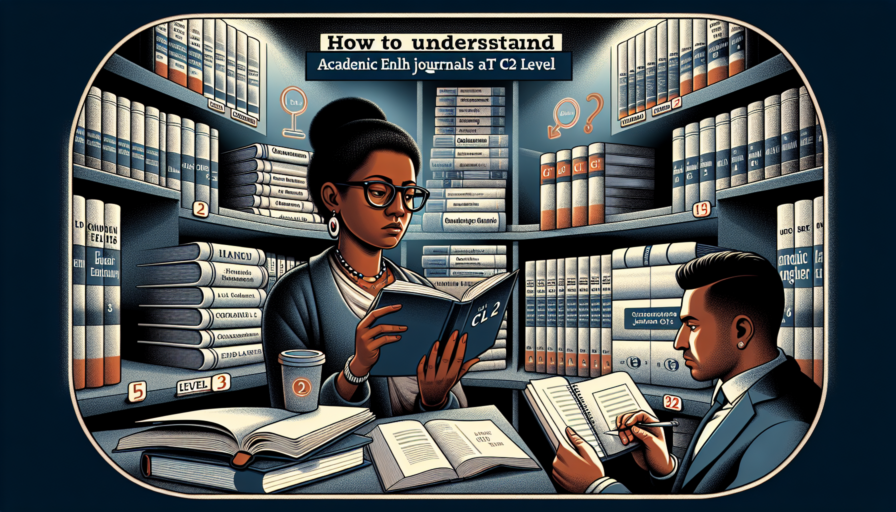
Contents
At Britannia School, we understand the significance of C2 Level English, often deemed the pinnacle of language proficiency in the Common European Framework of Reference for Languages (CEFR). So, what exactly does it mean to be at this level? In essence, a C2 level speaker possesses a near-native command of the English language, which allows for nuanced expression and comprehension. This proficiency is crucial for those aspiring to contribute to academic journals, where clarity and precision in communication are paramount.
Why does C2 Level English matter so much for academic writing? Here are several reasons:
Furthermore, the ability to write at a C2 Level not only enhances the chances of publication in prestigious academic journals but also significantly contributes to the scholarly conversation within one’s field. Researchers and scholars who can write with the authority and elegance associated with this proficiency stand a much better chance of their work being recognized and cited by peers, thereby elevating their academic careers.
As C2 learners navigating the intricate landscape of academic English, it’s essential to familiarize ourselves with the key features of academic English journals. These journals serve as vital resources, showcasing a wealth of research and scholarly discourse. Understanding their distinct characteristics will enhance our academic writing and research skills.
First and foremost, we should note the importance of peer review in these journals. Each article typically undergoes a rigorous evaluation process by experts in the field, ensuring that only high-quality and credible research is published. This aspect not only validates the work but also enhances our trust in the findings presented.
Another significant characteristic is the use of formal and precise language. Articles within academic English journals are crafted with a focus on clarity and conciseness, employing discipline-specific terminology and complex sentence structures that challenge and refine our understanding of advanced English. Additionally, we often encounter a structured format, consisting of sections such as:
By recognizing these components, we can better analyze and synthesize information, contributing to our growth as proficient C2 learners in the realm of academic English.
At Britannia School, we believe that mastering complex academic texts at the C2 level is achievable for all dedicated learners. We will explore effective strategies that can empower us to navigate these challenging materials with confidence. Our approach focuses on enhancing our comprehension skills and developing a deeper understanding of intricate concepts.
One strategy we can adopt is active reading. This involves not just skimming through texts, but engaging with the material by highlighting key points, annotating margins, and asking ourselves questions as we read. By breaking down the text into manageable sections, we can better analyze the arguments presented and relate them to our existing knowledge. Additionally, we can use graphic organizers to visualize the structure of complex ideas, facilitating better retention and understanding.
Another important tactic is to enhance our vocabulary comprehension. We should compile lists of specialized terminology found in academic literature and make it a habit to learn these words in context. Utilizing language tools, such as thesauruses and online dictionaries, allows us to delve into synonyms and antonyms, enriching our understanding of nuanced meanings. Incorporating these new terms into our own writing will not only reinforce our learning but also build our confidence when addressing sophisticated topics.
Lastly, we can engage in collaborative learning by joining study groups or discussion forums centered around academic texts. Sharing insights with peers encourages us to view complex material from different perspectives, deepening our intellectual engagement. By debating and discussing interpretations, we can demystify challenging passages and solidify our mastery of advanced academic language and concepts.
When we engage with academic journals, we often encounter various challenges that can hinder our comprehension of the material. One of the most prevalent issues is the complex language used in academic articles. Academics tend to employ specialized terminology and jargon that can be overwhelming. To navigate this, we should take the time to familiarize ourselves with common terms in our field. Creating a personal glossary can also prove invaluable for future reference.
Another challenge we face is the structure of academic papers. Journal articles typically follow a specific format that includes sections like the abstract, methodology, results, and discussion. Understanding this format is crucial for efficiently extracting key information. We can overcome this by developing a systematic approach to reading, such as skimming the abstract before diving deeper into each section.
Lastly, we might struggle with a lack of context regarding the significance of certain studies. It’s vital to connect the research to broader themes within our field. We can tackle this by seeking out review articles or summaries that provide background information and insight. By proactively addressing these challenges, we can enhance our understanding of academic journals and ultimately improve our academic performance.
At Britannia School, we understand the importance of having the right resources and tools to master Academic English journals at the C2 level. To help you enhance your academic writing skills, we’ve compiled a selection of invaluable resources designed to facilitate your understanding and proficiency in this area.
Incorporating these resources and tools into our study routine will significantly aid in the mastery of Academic English at the C2 level. By harnessing these valuable assets, we can develop a deeper understanding of the nuances of academic writing and improve our ability to produce high-quality journal contributions.